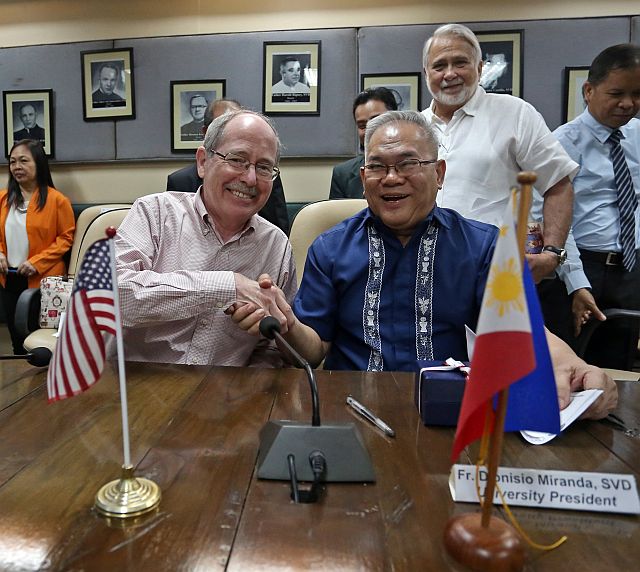
Fr. Michael Engh, SJ, of Sta. Clara University California President shakes hands with USC President Fr. Dionisio Miranda, SVR, after their meeting on the project. (CDN PHOTO/LITO TECSON)
A California-based university, together with the University of San Carlos (USC) and the Ramon Aboitiz Foundation Inc. (Rafi), is working on a community-based program to strengthen small-scale enterprises in Cebu and Central Visayas.
Representatives of Santa Clara University, a Jesuit-run university in Silicon Valley, California, met with USC’s School of Business and Economics and Rafi officials to map out the details of the program.
Fr. Michael Engh, university president of Santa Clara University, said they are lending their support to USC’s current micro-entrepreneurship programs.
Engh said these programs are aimed at tapping small enterprises as “instruments to alleviate poverty” in their communities.
He said they were impressed with the practicality of USC’s three micro-entrepreneurship programs, two of which had been running for 11 years.
Jon Ramon Aboitiz, Rafi vice president, discusses details of the project with Fr. Michael Engh of Sta. Clara University California and USC President Fr. Dionisio Miranda at the USC conference room. (CDN PHOTO/LITO TECSON)
“(But more than the community extension of micro-entrepreneurship programs) is eradicating poverty through social entrepreneurship wherein (we train) a businessman on providing social benefits to a community,” Engh said.
Engh cited as an example a businessman who built a solar plant to provide energy to a community.
USC President Dionisio Miranda said they welcomed Santa Clara University’s support.
“Santa Clara University’s programs serve as benchmarks on how to further sustain micro-entrepreneurship,” Miranda said.
He said a collaboration with them and Rafi needed a “very specific interface” and they will meet again to consider inviting other colleges and departments of USC for the project.
Dr. Challoner Matero, dean of USC’s School of Business and Economics, said they will review Santa Clara University’s micro-entrepreneurship program to see if it can be applied to Cebu.
“Since it’s an academic-collaboration, we in the academe must provide the results from our research before this will be implemented,” Matero said.